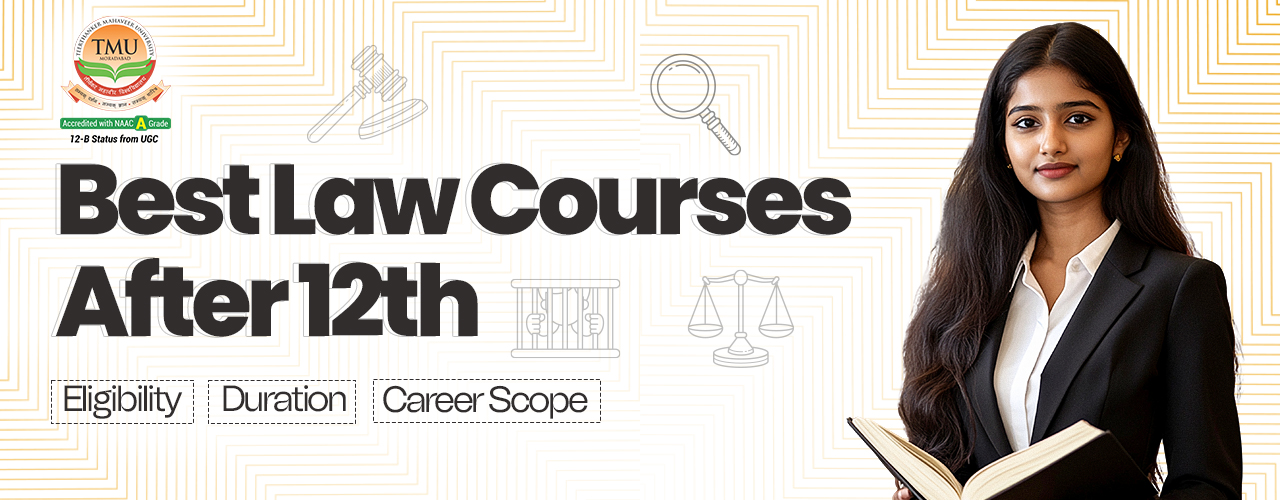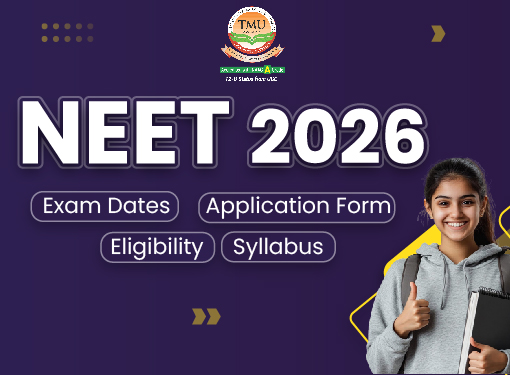Best Law Courses After 12th: Eligibility, Duration & Career Scope
Table of Contents
Choosing the right law courses after 12th is quite a difficult decision. The right course can turn your passion into a profession. Although the decision depends on your personal choice and preference, every course has something different to offer. All the key aspects should be taken into consideration before deciding on the right law courses after 12th.
With a wide range of law courses after 12th, students can dive into the dynamic world of courtroom action and legal research. Here, we’re giving you a complete guide to the best law courses after 12th. Let’s have a look:
Best Law Courses after 12th
Integrated Law Courses
BA LLB
Full Form- Bachelor of Arts and Bachelor of Legislative Law
Course Duration – 5 Years
BA LLB is a five-year integrated undergraduate degree programme that provides a comprehensive knowledge of both law and arts. It is a dual degree programme that covers subjects like history, sociology, and political science with legal studies. The course combines a liberal arts degree with legal education over five years.
Career Scope
- Advocate
- Senior Lawyer
- Civil lawyer
- Legal advisor
- Judicial Services
- NGO legal consultant
- Human rights lawyer
BBA LLB
Full Form- Bachelor of Business Administration and Bachelor of Legislative Law
Course Duration – 5 Years
BBA LLB is a dual degree programme that equips students with a unique combination of legal studies and business management skills. The duration of this programme is five years, divided into 10 semesters. The core subjects of this course are business strategy, marketing, finance, corporate law and civil law.
Career Scope
- Corporate lawyer
- Senior advisor
- Compliance Officer
- Banking & Finance Analyst
- Business Consultant
- CS
B.Com LLB
- Full Form- Bachelor of Commerce and Bachelor of Legislative Law
- Course Duration – 5 Years
B.Com LLB is a five-year undergraduate degree programme that provides a strong foundation in both business and legal studies. It is a dual-degree programme that covers subjects such as corporate finance, taxation, and commercial laws. The programme is designed to prepare graduates for careers at the intersection of business and law.
Career Scope
- Tax Lawyer
- Corporate legal counsel
- Compliance Auditor
- Legal advisor
- Litigation Specialist
BSc. LLB
BSc LLB provides comprehensive knowledge of both scientific and legal studies. It is also a five-year dual integrated LLB programme that equips students for careers in law-related areas that intersect with science, such as environmental law, forensic science, and intellectual property law.
- Full Form- Bachelor of Science and Bachelor of Legislative Law
- Course Duration – 5 Years
Career Scope
- Environmental Law
- Forensic Law
- Medical Law
- Intellectual Property Rights (IPR)
Teerthanker Mahaveer University
Apply for Admission
Click Here To Apply for Admission
Diploma in Law Courses after 12th
Diploma in Corporate Law
Course Duration – 3-6 months
A diploma in corporate law provides comprehensive knowledge of legal principles related to business, compliance, and corporate governance. It covers topics such as company formation, director responsibilities, securities law, and contract negotiation. The programme is designed to equip students with skills for careers in corporate law or legal advisory.
Career Scope
- Corporate legal assistance
- Documentation Executive
- Contract management assistant
- Compliance support staff
- Legal research assistant
Diploma in Cyber Law
Course Duration – 3-6 months
A diploma in cyber law is a specialised programme that provides knowledge of cybercrime, data protection, and intellectual property. It covers topics such as cybercrime, e-commerce, intellectual property, digital forensics and international cyber law. After pursuing this course, graduates can earn an average salary from ₹16.3 lakh per year to ₹ 42.5 lakh per year based on position.
Career Scope
- Cyber Law Assistant
- Cybercrime Investigator (entry-level)
- IT Law Support Executive
- Cybersecurity Legal Assistant
- Documentation & Compliance Assistant
Diploma in Taxation Law
Course Duration – 3-6 months
A diploma in taxation law provides in-depth knowledge of tax laws and practices. The programme is designed to equip students with the skills of tax planning, compliance, and preparing tax-related documents. The curriculum of this course focuses on areas like the Indian Income Tax Act, corporate tax law, GST, and customs law.
Career Scope
- Tax Assistant
- GST Filing Executive
- Compliance Documentation Assistant\
- Tax Law Support Staff
- Finance & Accounting Legal Assistant
Diploma in Labour Law
Course Duration – 3-6 months
A diploma in labour law is a specialised programme that provides in-depth knowledge of the laws, regulations, and welfare policies. The programme covers topics like employment contracts, wages, working hours, industrial disputes, social security, employee rights, and workplace safety. It is designed to provide practical knowledge for handling labour-related legal matters.
Career Scope
- HR Compliance Assistant
- Labour Law Documentation Executive
- Payroll & Labour Policy Support
- Legal Support in Factories/Industrial Units
Diploma in Human Rights Law
Course Duration – 3-6 months
A diploma in human rights law is suitable for those who wish to build a career in law, social work, international relations, journalism, or any other field related to social justice. The programme educates students about the rights of human law and how to protect and promote these rights through legal and policy-related means. It covers topics like international human rights law, humanitarian issues, gender equality, and social justice.
Career Scope
- NGO Legal Support
- Human Rights Assistant
- Social Justice Documentation Executive
- Research Assistant (Human Rights cases)
Certifications Law Courses after 12th
- Certificate in Environmental Law
- Certificate in International Trade Law
- Certificate in Taxation Law
- Certificate in Media and Entertainment Law
- Certificate in Alternative Dispute Resolution (ADR)
- Certification in Human Rights
- Certification in Cyber Law
Law Entrance Exams
| Exam | Level | Courses Offered |
| CLAT | National | BA LL.B, BBA LL.B, B.Com LL.B |
| AILET | National | BA LL.B |
| LSAT India | National | All 5-year law courses |
| CUET | National | Central universities law programs |
| SLAT | University-level | BA LL.B, BBA LL.B |
Read More: CLAT 2026 Exam Date Out—Check Paper Pattern, and Syllabus
Best Colleges for Law Courses after 12th
| College Name | Location | Key Features |
| Aligarh Muslim University (AMU) | Aligarh | Offers BA LLB, LLB, and LLM programs; known for strong academics |
| Babasaheb Bhimrao Ambedkar University | Lucknow | Offers integrated LLB/LLM programs; reputed faculty, strong research culture |
| Dr Ram Manohar Lohiya National Law University | Lucknow | Known for excellent placements and a strong moot court culture |
| Teerthanker Mahaveer University (TMU) | Moradabad | Offers BCI-approved law programs, advanced infrastructure, and an industry-aligned curriculum, |
| Banaras Hindu University (BHU) | Varanasi | Renowned faculty, rich academic history, vibrant campus life, and a strong alumni network. |
Why choose TMU for the LLB programme?
Teerthankar Mahaveer University stands out as a preferred choice for law courses after 12th due to its Bar Council of India (BCI)-approved curriculum, which includes a 5-year integrated LLB and an LLM programme. TMU comes under the top law colleges in UP. The university offers high-quality education, as it includes theoretical education and practical training.
Eligibility for the LLB program
To study the Law courses after 12th, you have to check the following criteria:
- Educational Criteria: You must have completed 10+2 to apply for the law courses after 12th. In case you are pursuing the LLM programme, then you must complete your graduation with a law degree.
- Score: The minimum score required for the bachelor's programme is 45%. For the LLM programme, you have to achieve a minimum of 50% in your graduation.
- Stream: Students from any stream can apply for the BA LLB law courses after 12th. For BBA LLB & B.COM LLB, you are required to have a commerce or science stream.
- Criteria of Merit: Admissions are based on the merit score of the entrance exam, such as CLAT or the percentage of marks secured in the qualifying examination.
Career Opportunities
| Career Path | Short Description |
| Advocate / Lawyer | Represents clients in court and provides legal advice. |
| Corporate Lawyer | Handles company laws, contracts, and business compliance. |
| Judge | Presides over cases and delivers judgments. |
| Legal Advisor / Consultant | Offers legal guidance to individuals or organisations. |
| Public Prosecutor | Represents the government in criminal cases. |
| Legal Researcher | Conducts legal research and analyses case laws. |
| Law Officer in Government | Manages legal matters in government departments. |
| Notary Public | Certifies legal documents and agreements. |
| Corporate Compliance Officer | Ensures businesses follow legal and regulatory norms. |
| Academician / Professor | Teaches law and guides academic research. |
| Legal Content Writer | Writes legal articles, blogs, and updates. |
Conclusion
Pursuing law courses after 12th provides you with a powerful blend of knowledge and skills in legal studies. With strong career opportunities and growth, this profession continues to grow in demand. This five-year journey provides you with all-encompassing knowledge of legal studies and the humanities, plus good analytical and communication skills, and the ability to think critically and ethically. It imparts to you the power to be a responsible citizen.
FAQ
Q1. What are the best law courses after 12th?
Ans. There are numerous LLB courses available after 12th. The choice depends on your interest and academic background.
Q2. Is LLB or BA LLB better are better law courses after 12th?
Ans. Yes, both LLB and BA LLB are the best law courses after 12th. Graduates can become a lawyer, judge, legal advisor, or corporate lawyer.
Q3. Can I do a 3-year LLB after 12th?
Ans. No, a 3-year LLB is available after graduation. You can pursue a 5-year LLB programme after completing 12th grade.
Q4. Can I join LLB without CLAT?
Ans. Yes, you can pursue LLB without CLAT. Many universities offer LLB programmes through their own entrance exam or direct admission process.
Q5. What are five careers in Law?
Ans. The five major careers in law are:
- Bankruptcy paralegal
- Corporate lawyer
- Corporate attorney
- Employment lawyer
- Family lawyer
Q6. What is the duration of LLB?
Ans. The duration of the LLB programme is 5 years, which is divided into 10 semesters.















